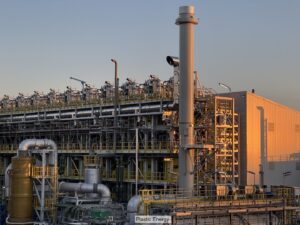Plastic Energy Produces First Recycled Oil at Advanced Recycling Plant in the Netherlands
A key milestone for the joint venture SABIC Plastic Energy Advanced Recycling (SPEAR)

Photo: Plastic Energy
Plastic Energy, a U.K.-based global leader in chemical recycling, has announced production of its first pyrolysis oil at its joint venture plant with SABIC in Geleen, the Netherlands. The company says it marks a key milestone on the road to full commercial operations.
The recycled product, known as TACOIL™, is made from hard-to-recycle consumer plastic waste that would otherwise be lost to landfill or incineration. As Plastic Energy reports, the recycled oil serves as a replacement for conventional naphtha in existing petrochemical plants, enabling the manufacture of food-contact packaging, medical-grade plastics and other high-quality products.
The SPEAR facility, which is set to be the first example of a third-party chemical recycling technology being integrated into an existing petrochemical facility, will help to safely increase the use of recycled plastics in packaging and decrease the use of virgin materials in packaging, putting the sector on track to climate neutrality by 2050.
Accelerating the circular transition in the Dutch chemicals ecosystem
The plant of SPEAR BV, a 50-50 joint venture between Plastic Energy and SABIC, was announced in 2021. The project has been realized with a Top Sector Energy subsidy from the Ministry of Economic Affairs. The plant is located at Chemelot in Geleen, which is a key site for research & development and manufacturing in the Dutch chemicals ecosystem.
Innovative technology powers sustainable solutions
Ian Temperton, Chief Executive Officer of Plastic Energy, said: “Producing our first TACOIL™ at SPEAR is a major step forward for the plastic recycling industry. It underscores the capabilities of Plastic Energy’s technology, the robustness of our process and the dedication of our excellent team. We value the collaboration with our project partner SABIC and are proud to have achieved this milestone together.
“Recycling plastic waste into new plastics is critical to building a circular economy — and that’s exactly what this plant delivers. It boosts recycling rates, helps reduce CO2 emissions by diverting used plastic from incineration, and shows what’s possible when innovation meets scale.”
The SPEAR facility is expected to become fully commercially operational at the end of 2025 and recycle some 20,000 tonnes of plastic waste per year.
Source: Plastic Energy
1 September 2025